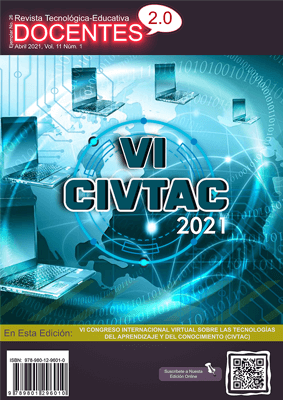The Conceptual Map as a Pedagogical Strategy in the Learning of Disciplinary Concepts of Economics
 DOI:
https://doi.org/10.37843/rted.v11i1.194
DOI:
https://doi.org/10.37843/rted.v11i1.194
Main Article Content
Abstract
The academic article described below is the underlying work of an investigative process aimed at analyzing the incidence of Novak's theory in the learning of disciplinary concepts of the subject Economic History of Colombia in students of the 4th semester of the Economics program of the University of Pamplona, ??Colombia, the study is of mixed approach, where in order to achieve the established objective, an identification process was carried out in accordance with the learning of disciplinary concepts in the students under study. Likewise, as instruments for collecting information, a diagnostic test by competencies, an aptitude test and a final interview were applied, results with which it was possible to establish the impact and incidence of concept maps in the teaching of disciplinary concepts of Economics. The results obtained show the importance of incorporating tools such as concept maps for teaching theoretical content, where it is necessary for teachers to adapt their pedagogical methods to the learning needs of their students, seeking not only the teaching content in a mechanical way, but rather generating in them enough intrinsic motivation that allows them to acquire skills so that they can build meaningful quality learning, according to the economic demands that are presented in today's world.
Downloads
Metrics
Article Details

This work is licensed under a Creative Commons Attribution-NonCommercial-NoDerivatives 4.0 International License.
Those authors who have publications in our journal accept the following terms:
- When a work is accepted for publication, the author retains rights of reproduction, distribution of his/her article for exploitation in all countries of the world in the format provided by our magazine and any other magnetic medium, optical, and digital.
- Authors will retain their copyright and guarantee the journal the right first to publish their work, which will be simultaneously subject to the Creative Commons Acknowledgment License (Attribution-NonCommercial-NoDerivatives 4.0 International (CC BY-NC-ND 4.0)). That allows third parties to copy and redistribute the material in any medium or format, under the following conditions: Acknowledgment - You must properly acknowledge authorship, provide a link to the license, and indicate if any changes have been made. You may do so in any reasonable way, but not in a way that suggests you have the licensor's endorsement or receive it for your use. NonCommercial - You may not use the material for a commercial purpose. NoDerivatives - If you remix, transform, or build from the material, you cannot broadcast the modified material. There are no additional restrictions - You cannot apply legal terms or technological measures that legally restrict you from doing what the license allows.
- Authors may adopt other non-exclusive license agreements to distribute the published version of the work (e.g., deposit it in an institutional archive or publish it in a monographic volume) provided that the initial publication in this journal is indicated.
- Authors are allowed and recommended to disseminate their work through the Internet (e.g., in institutional telematic archives, repositories, libraries, or their website), producing exciting exchanges and increasing the published work's citations.
- Request of withdrawal an article has to be done in writing by the author to the Editor, becoming effective after a written response from the Editor. For this purpose, the author or authors will send correspondence via e-mail: [email protected].
- The author will not receive financial compensation for the publication of his work.
- All Docentes 2.0 Journal publications are under the Open Journal System (OJS) platform at: https://ojs.docentes20.com/.
References
Ausubel, D. (1988). Teoría del aprendizaje significativo. Psicología y Mente. https://psicologiaymente.com/desarrollo/aprendizaje-significativo-david-ausubel
Estrada, J., & Correa, J. (2019). El proceso enseñanza–aprendizaje y los mapas conceptuales: una reflexión desde la educación en ciencias de la salud. Obtenido de U Nacional de Colombia. https://revistas.unal.edu.co/index.php/actaodontocol/article/view/75747
Guerra, M. (2018). La teoría del aprendizaje significativo de Ausubel. Psicoactiva. https://www.psicoactiva.com/blog/aprendizaje-significativo-ausubel/
Hernández-Sampierí, R., Fernández, C., & Batista, P. (2014). Metodología de la Investigación Sexta Edición. Universidad de Cartagena. http://observatorio.epacartagena.gov.co/wp-content/uploads/2017/08/metodologia-de-la-investigacion-sexta-edicion.compressed.pdf
Mendieta, G. (2015). Informantes y muestreo en investigación cualitativa. Investigaciones Andina. https://www.redalyc.org/pdf/2390/239035878001.pdf
Novak, J. (1988). Teoría del aprendizaje significativo. [Video]. Monografías.Com. https://www.youtube.com/watch?v=9ag2RyDdBWU&ab_channel=FearlessRecords
Restrepo, B. (2004). La investigación-acción educativa y la construcción de saber pedagógico. Educación y Educadores. https://www.redalyc.org/pdf/834/83400706.pdf
Sabino, C. (2008). El proceso de investigacion. Ufm. Es. http://paginas.ufm.edu/sabino/ingles/book/proceso_investigacion.pdf
Kalmanovitz, S. (2017). Breve Historía Económica de Colombia. http://kimera.com/data/redlocal/ver_demos/RLBVF/VERSION/RECURSOS/REFERENCIA%20ESCOLAR/2%20BIBLIOTECA%20BASICA%20COLOMBIANA/breve%20historia%20economica%20de%20colombia%20bbcc_libro_pdf_090%20.pdf
Toro, C., Cepeda, C., & Gil, L. (2018). Uso del mapa conceptual como estrategia didáctica para mejorar la comprensión lectora. https://revistas.uptc.edu.co/index.php/educacion_y_ciencia/article/view/9391
Tusa, E. (2017). Aprendizaje memorístico–significativo. https://fido.palermo.edu/servicios_dyc/publicacionesdc/vista/detalle_articulo.php?id_libro=684&id_articulo=14320
Unesco (2015). La Educación, la Ciencia y la Cultura. https://es.unesco.org
Velasquez, L., Revilla, J., & Guerra, M. (2018). Confección de mapas conceptuales para la enseñanza de la Química Orgánica. http://scielo.sld.cu/scielo.php?script=sci_abstract&pid=S2224-54212018000300012&lng=es&nrm=iso
Viera, T. (2003). El aprendizaje verbal significativo de Ausubel. Algunas consideraciones desde el enfoque histórico. https://www.redalyc.org/pdf/373/37302605.pdf
Vilboa, P., Paris, M., & Vargas, R. (2013). Aplicando mapas conceptuales como estrategia para generar un espacio de aprendizaje colaborativo. http://sedici.unlp.edu.ar/bitstream/handle/10915/27545/Documento_completo.pdf?sequence=1&isAllowed=y
Yaber, I., Ariza, D., & Muñiz, J. (2008). Los mapas conceptuales como estrategia didáctica para el aprendizaje de conceptos de biología celular en estudiantes universiatrios. http://manglar.uninorte.edu.co/bitstream/handle/10584/692/3776456.pdf?sequence=1&isAllowed=y
Yanez, J. (2020). A Propósito del aprendizaje: Un paralelo entre Ausubel y Feuerstein. https://pensar-lopensado.com/a-proposito-del-aprendizaje-un-paralelo-entre-ausubel-y-feuerstein/






